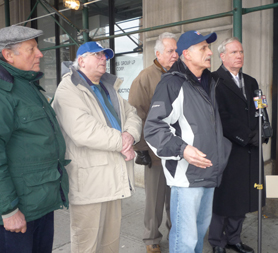Right: On January 5th, Councilman Tony Avella and the Juniper Park Civic Association held a news conference outside the Board of Standards and Appeals headquarters in Manhattan calling attention to the recent BSA decision to allow a cell tower atop a residential property adjacent to Frank's Deli at 53-20 72nd Place in Maspeth. Left to right: Reinhold Stehle, member of Ridgewood Property Owners and Civic Association, JPCA Executive Board Members Bob Doocey, Manny Caruana and Dieter Keppler and Councilman Avella.
If the framers of the Constitution/Declaration of Independence were still alive today, I am confident they would cite the operation and existence of the City’s Board of Standards and Appeals (BSA) as a perfect example of unrepresentative government. It is time for this unresponsive, undemocratic bureaucratic body to go!
For many New Yorkers BSA is a totally unknown entity, yet its impact is being felt in every neighborhood in this City.
A quasi-judicial agency, BSA is comprised of five Commissioners appointed by the Mayor for six-year terms to, in large part, issue variances to the zoning code. It is the implementation of this responsibility that has irked, frustrated and outright angered elected officials, community boards and residents.
The original mission of BSA was to provide a relief valve for property owners in those rare circumstances where existing zoning regulations would prohibit them from reasonably developing their property. I stress the word “rare.”
Unfortunately, BSA has been allowed to mushroom into a huge loophole for developers who want to circumvent the law. For far too long developers have used BSA as “an old boys network” where a handful of law firms represent hundreds of clients/developers trying to build in excess of existing building and zoning code requirements.
While the Borough Presidents and Community Boards routinely submit comments on variance applications, their opinions are only advisory and often dismissed by BSA.
Despite BSA’s assertions to the contrary, Borough President and Community Board recommendations are generally only successful in achieving very minor changes to original plans. It is fascinating to note that Council Members have no official role in the process other than to receive a copy of the application.
When reviewing applications, BSA must evaluate the request in terms of the following five criteria:
• Does the unique condition of the property prevent reasonable development?
• Would unique property conditions prevent an owner from obtaining a reasonable financial return?
• Does the variance, if granted, alter the essential character of the neighborhood?
• Is the situation the result of a self-imposed hardship? (In other words – you cannot buy a property knowing the restrictions and then claim hardship)
• Is the variance requested the minimum necessary to afford relief?
Unfortunately, BSA routinely disregards these guidelines. The self-imposed hardship restriction is rarely enforced. The BSA requirement that the variance will not alter the character of the neighborhood is a joke! It is never really considered.
And why does the City, through BSA, reward developers for making a bad financial decision. If you own any other type of business in this city and make a bad investment or your business fails, the city does not bail you out. But, BSA will grant a financial hardship variance for developers who make poor judgments or risky investments. This practice clearly demonstrates the huge political influence that the real estate industry enjoys in this City. It is a foolproof system that rescues developers from their own incompetence and investment mistakes.
To justify their favorable actions towards developers, BSA will frequently rely on their “quasi-judicial” status as a defense. This convenient excuse provides political cover for their lack of common sense and failure to adhere to the five variance criteria. Yet, the qualifications for appointment to the Board say nothing about being an attorney.
The only qualifications mentioned in the City Charter are that one Commissioner shall be a registered architect with at least 10 years’ experience as an engineer and one shall be a planner with professional qualifications and with at least 10 years’ experience as a planner. Why is there no requirement that the Commissioners have legal experience? Because it was never meant to be the final legal arbiter of these land use issues.
Ever since the old Board of Estimate was eliminated, the only recourse for New Yorkers to appeal BSA decisions is to file an Article 78 lawsuit against the City – a time consuming and expensive proposition. Good luck in trying to get satisfaction by that route!
When the Board of Estimate was in existence, BSA decisions could be appealed to that legislative body. Under that system, at least New Yorkers had the opportunity to press their case for justice before officials elected by the people as opposed to the appointed bureaucrats on BSA.
Since taking office in January of 2002, I have authored several pieces of legislation in an attempt to reform this agency. Unfortunately, all of them are languishing in the City Council as a direct result of the pressure exerted by the real estate industry and the opposition from the Mayor’s Administration.
In order to address the lack of oversight and an appeal process, I introduced Intro. 261/2006. This legislation would re-establish the review process over variance and special permits decisions, previously held by the former Board of Estimate, under the auspices of the City Council.
The City Council already has jurisdiction in land use matters under the Uniform Land Use Review Procedure (ULURP). Adding this review process would strengthen the ULURP procedure and add balance to this area of land use decision-making.
I authored two other bills in a further attempt to address the total control of the Mayor in appointing members to the Board.
Intro. 263/2006 if enacted, would expand the number of BSA Commissioners from five to thirteen, with the eight additional members to be appointed, one each, by the Borough Presidents, Public Advocate, Comptroller and City Council. The five mayoral appointees would remain; but their voices would be tempered by those of the eight additional members. Obviously, this would enable elected officials to better serve their constituents by having direct representation on the Board.
As a companion bill to Intro. 263, I introduced Intro. 262/2006, which would require that all variance and special permit decisions by BSA be made by a two-thirds majority of the quorum present and voting. Once the membership of BSA is expanded to 13 members, requiring a two-thirds majority vote would ensure that decisions of such magnitude are addressed by a substantial majority of the Board.
In February 2008, I introduced Intro. 695/2008, which would require one of the members of BSA to be a financial analyst with professional qualifications. Since one of the five variance criteria involves the review of an alleged financial hardship, it only makes sense to have a member of the Board who has the financial background to determine the legitimacy of any such claim by a developer.
I am also in the process of writing legislation that would change the statute of limitations for filing an Article 78 proceeding challenging BSA decisions, from thirty days to four months.
The current 30-day time frame presents an unnecessarily harsh procedural hurdle. The very short time frame within which an Article 78 petition must be filed makes such challenges extremely difficult to execute due to the cost and extensive preparation that is required in bringing these actions before the Supreme Court.
The majority of Article 78 BSA cases are brought by aggrieved citizens who need a significant amount of time to come up with funds to retain counsel and for counsel to properly prepare the necessary petitions and accompanying documents that must be filed. Making this change in the law would provide residents and community groups the necessary time to properly develop and file an Article 78.
The passage of any of these bills would make a significant impact on how BSA operates and allow for additional community input and a more balanced decision making process.
Having said that, I have come to believe that BSA decisions are so skewed in favor of developers that the entire system must be scrapped.
After personally testifying before the Board on numerous variance applications on behalf of the community, not only those within my Council District, but other neighborhoods/boroughs as well, I have come to realize that the entire process is a charade.
It is extremely disheartening to watch neighborhood residents travel to the BSA office in lower Manhattan for hearing after hearing to contest a variance application, only to see the Commissioners vote in unison to approve the application.
It has become a BSA routine; whereby multiple hearings are held on an item until; it would appear, the community is simply worn down. It is almost impossible for the average person to continuously take time off from work or other duties to fight the developers.
In the final analysis, while most people do not know this agency even exists, it has had and continues to have a dramatic and damaging effect on the residential character of neighborhoods throughout our city by allowing developers to circumvent the zoning – in many cases ruining the quality of life for millions of New Yorkers. It is time to end this sham and close what is the biggest loophole for developers.
Abolish the Board of Standards and Appeals!



